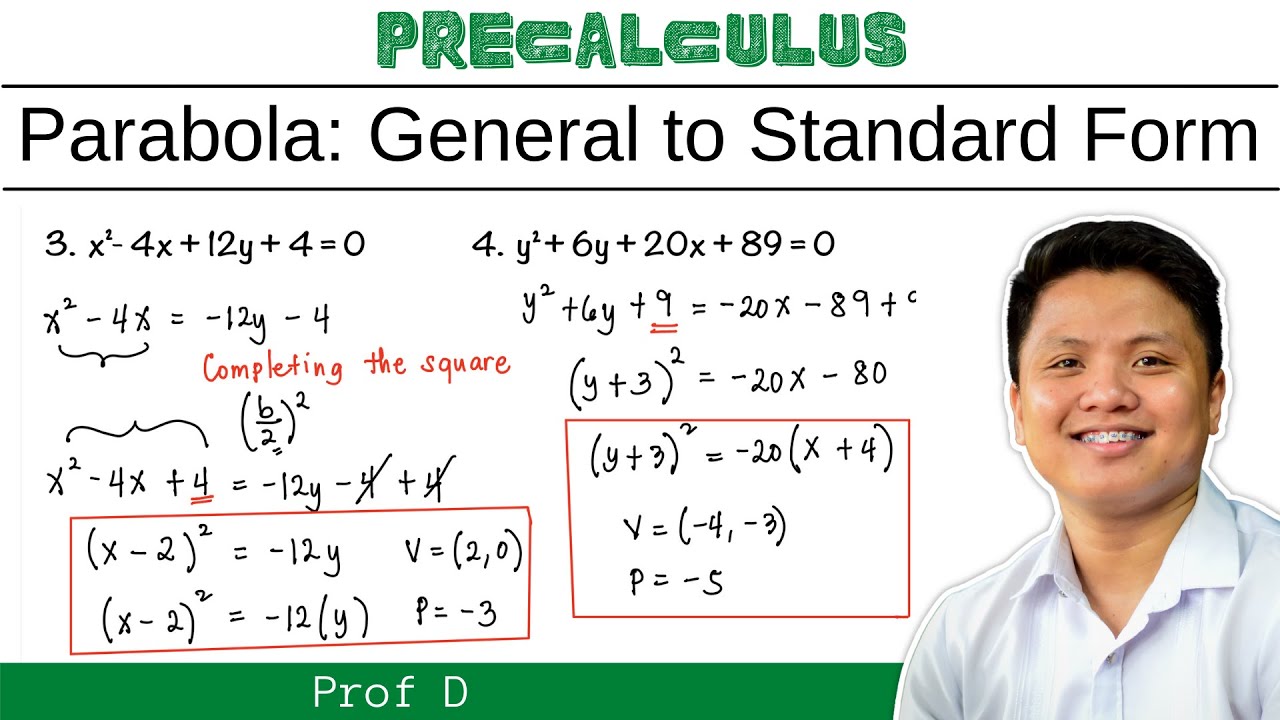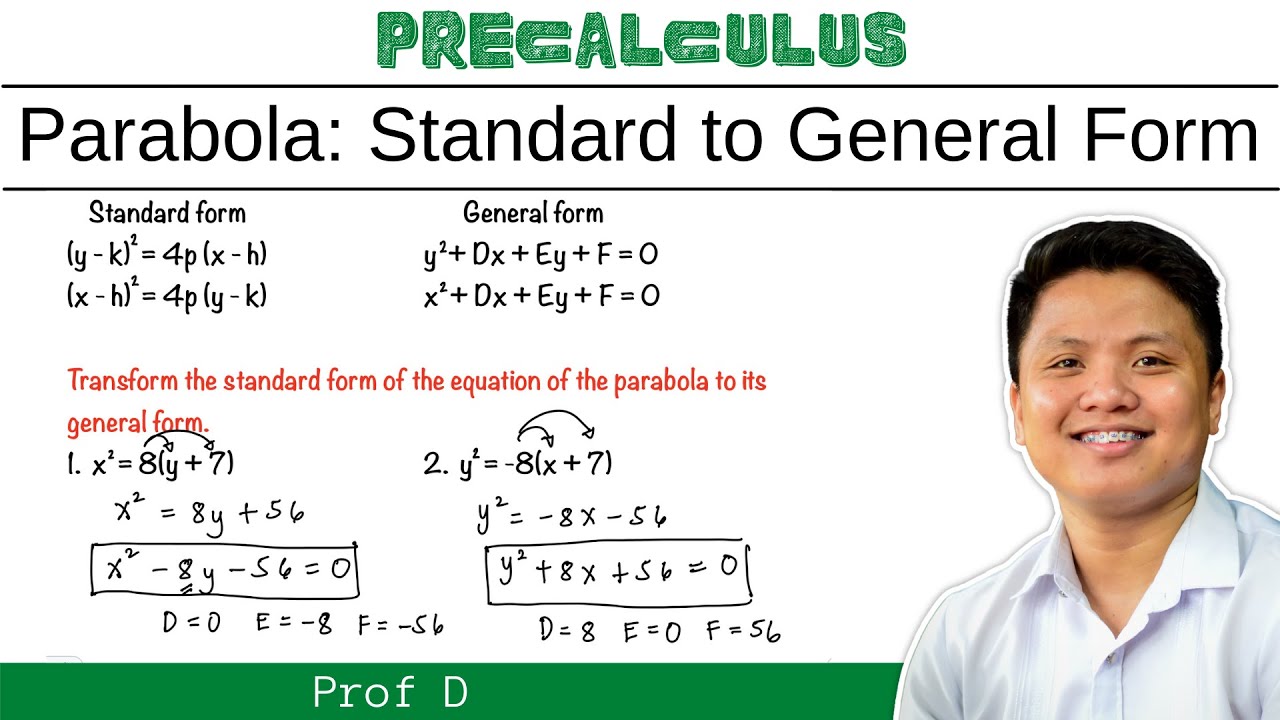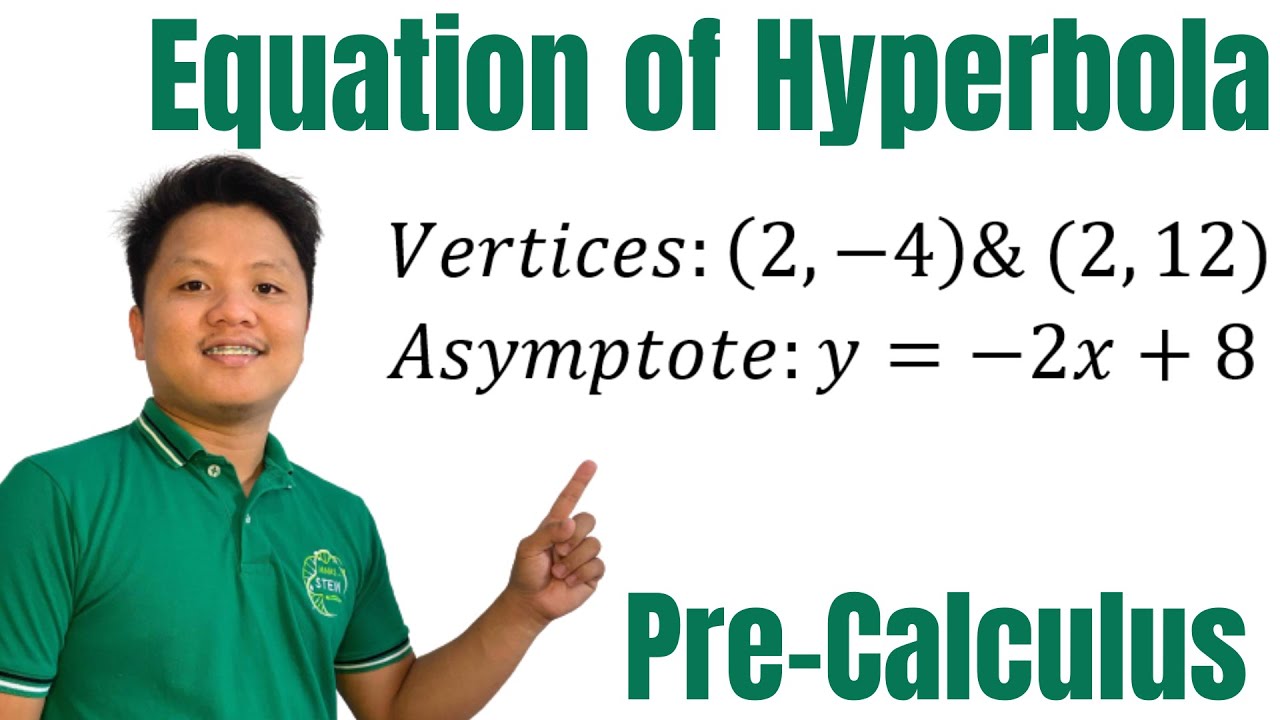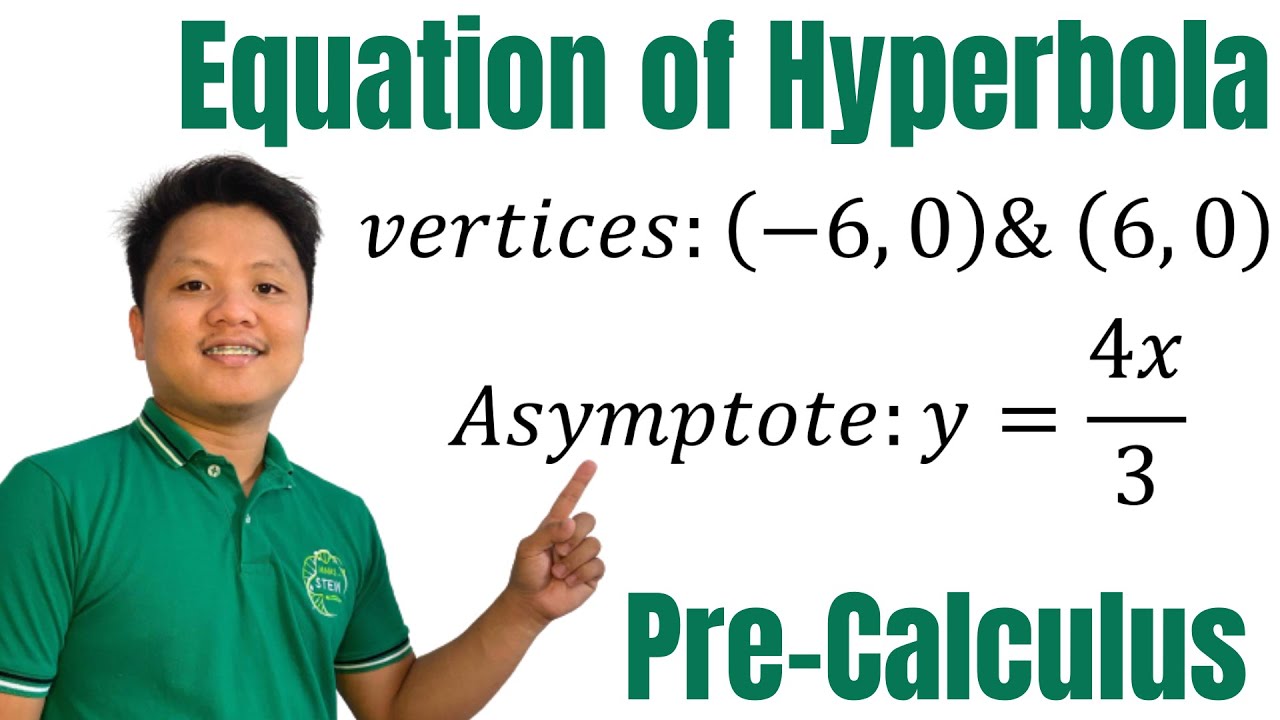How to find the equation of Hyperbola given its graph
TLDRIn this educational video, Prof D guides viewers through the process of deriving the equation of a hyperbola from its graph. The video begins by explaining the standard equations for hyperbolas that open horizontally and vertically. Two examples are then presented, with step-by-step instructions on how to identify key parameters such as the center, vertex, and conjugate axis. The examples demonstrate how to substitute these values into the standard equations to obtain the hyperbola's equation in standard form. The video concludes with an invitation for viewers to ask questions in the comment section, ensuring an interactive learning experience.
Takeaways
- 📚 The video provides a tutorial on how to find the equation of a hyperbola given its graph.
- 📐 The standard equation for a horizontally opening hyperbola is \((x-h)^2/a^2 - (y-k)^2/b^2 = 1\).
- 📏 The standard equation for a vertically opening hyperbola is \((y-k)^2/a^2 - (x-h)^2/b^2 = 1\).
- 🔍 The center of the hyperbola is denoted by the coordinates (h, k).
- 📏 The value 'a' represents the distance from the center to a vertex for a horizontally opening hyperbola.
- 📏 The value 'b' represents the distance from the center to a co-vertex for a hyperbola.
- 🔢 The script uses an example where the hyperbola opens horizontally with a center at (-3, 3), a vertex 4 units away, and a co-vertex 3 units away.
- 🧩 In the example, the equation of the hyperbola is derived by substituting the values of h, k, a, and b into the standard equation.
- 📝 The second example demonstrates a vertically opening hyperbola with a center at (-2, -1), a vertex 4 units away, and a co-vertex 2 units away.
- 🔍 The second example also involves substituting the values of h, k, a, and b into the standard equation to find the hyperbola's equation.
- 👋 The video concludes with an invitation for viewers to ask questions or seek clarifications in the comment section.
Q & A
What is the standard equation for a hyperbola that opens horizontally?
-The standard equation for a hyperbola that opens horizontally is \( \frac{(x - h)^2}{a^2} - \frac{(y - k)^2}{b^2} = 1 \), where \( h \) and \( k \) are the coordinates of the center, \( a \) is the distance from the center to the vertices, and \( b \) is the distance from the center to the endpoints of the conjugate axis.
What is the standard equation for a hyperbola that opens vertically?
-The standard equation for a hyperbola that opens vertically is \( \frac{(y - k)^2}{a^2} - \frac{(x - h)^2}{b^2} = 1 \), with the same meaning for \( h \), \( k \), \( a \), and \( b \) as in the horizontal case.
What does 'a' represent in the hyperbola equation?
-'a' in the hyperbola equation represents the distance from the center of the hyperbola to its vertices along the transverse axis.
What does 'b' represent in the hyperbola equation?
-'b' in the hyperbola equation represents the distance from the center of the hyperbola to its endpoints on the conjugate axis.
How can you determine if a hyperbola opens horizontally or vertically?
-A hyperbola opens horizontally if the \( x \)-term is positive and the \( y \)-term is negative in the standard equation, and it opens vertically if the \( y \)-term is positive and the \( x \)-term is negative.
What is the center of the hyperbola in Example 1?
-The center of the hyperbola in Example 1 is at the point \( (h, k) = (-3, 3) \).
What is the value of 'a' in Example 1?
-In Example 1, the value of 'a' is 4 units, as it is the distance from the center to the vertex.
What is the value of 'b' in Example 1?
-In Example 1, the value of 'b' is 3 units, as it is the distance from the center to the endpoint on the conjugate axis.
How is the equation of the hyperbola in Example 1 simplified?
-The equation of the hyperbola in Example 1 is simplified by substituting the values of \( h \), \( k \), \( a \), and \( b \) into the standard equation for a horizontally opening hyperbola and simplifying the resulting expression.
What is the center of the hyperbola in Example 2?
-The center of the hyperbola in Example 2 is at the point \( (h, k) = (-2, -1) \).
What is the value of 'a' in Example 2?
-In Example 2, the value of 'a' is 4 units, as it is the distance from the center to the vertex along the vertical axis.
What is the value of 'b' in Example 2?
-In Example 2, the value of 'b' is 2 units, as it is the distance from the center to the endpoint on the conjugate axis along the horizontal axis.
How is the equation of the hyperbola in Example 2 simplified?
-The equation of the hyperbola in Example 2 is simplified by substituting the values of \( h \), \( k \), \( a \), and \( b \) into the standard equation for a vertically opening hyperbola and simplifying the resulting expression.
Outlines
📚 Introduction to Finding the Hyperbola Equation
This paragraph introduces the video's objective to teach viewers how to derive the equation of a hyperbola from its graph. It explains the standard equations for hyperbolas that open horizontally and vertically, highlighting the importance of identifying the center, vertices, and the distance between the center and the vertex (a), as well as the distance between the center and the endpoint of the conjugate axis (b). The video promises to guide through examples to illustrate these concepts.
📐 Example 1: Horizontal Hyperbola
The first example provided in the script involves a hyperbola that opens horizontally. The instructor begins by identifying the center (h, k) and the values of a and b, which are derived from the distances between the center and the vertex, and the center and the endpoint of the conjugate axis, respectively. The formula for a horizontal hyperbola is given, and the instructor proceeds to substitute the identified values into the formula, simplifying it to find the equation of the hyperbola in standard form.
📉 Example 2: Vertical Hyperbola
In the second example, the script discusses a hyperbola that opens vertically. Similar to the first example, the instructor identifies the center (h, k) and the values of a and b. The standard equation for a vertical hyperbola is presented, and the instructor substitutes the values of h, k, a, and b into this equation. After simplification, the equation of the vertical hyperbola in standard form is obtained. The video concludes with an invitation for viewers to ask questions or seek clarifications in the comment section and a farewell from the instructor.
Mindmap
Keywords
💡Hyperbola
💡Equation
💡Graph
💡Center
💡Vertex
💡Asymptote
💡Conjugate Axis
💡Horizontally Opening Hyperbola
💡Vertically Opening Hyperbola
💡Standard Equation
💡Transverse Axis
Highlights
Introduction to finding the equation of a hyperbola given its graph.
Explanation of the standard equation for a horizontally opening hyperbola.
Explanation of the standard equation for a vertically opening hyperbola.
Identification of the center, vertex, and foci for a horizontally opening hyperbola.
Calculation of 'a' as the distance between the center and the vertex.
Calculation of 'b' as the distance between the center and the endpoint on the conjugate axis.
Substitution of 'h', 'k', 'a', and 'b' into the hyperbola formula for a horizontally opening hyperbola.
Simplification of the hyperbola equation into standard form for a horizontally opening hyperbola.
Introduction to example number two with a vertically opening hyperbola.
Identification of the center and vertex for a vertically opening hyperbola.
Calculation of 'a' and 'b' for a vertically opening hyperbola.
Substitution of 'h', 'k', 'a', and 'b' into the hyperbola formula for a vertically opening hyperbola.
Simplification of the hyperbola equation into standard form for a vertically opening hyperbola.
End of the video with an invitation for questions and clarifications in the comments.
Closing remarks and sign-off from Prof D.
Transcripts
Browse More Related Video

Transforming General Form to Standard Form of Parabola | @ProfD

Transforming Standard Form to General Form of Parabola | @ProfD

Learn How to Graph a Hyperbola | Graphing Hyperbola with Center at the Origin

EQUATION OF CIRCLE IN STANDARD FORM | PROF D

How to find the equation of Hyperbola given vertex, and the equation of asymptote

Find the equation of Hyperbola given vertices and asymptote
5.0 / 5 (0 votes)
Thanks for rating: